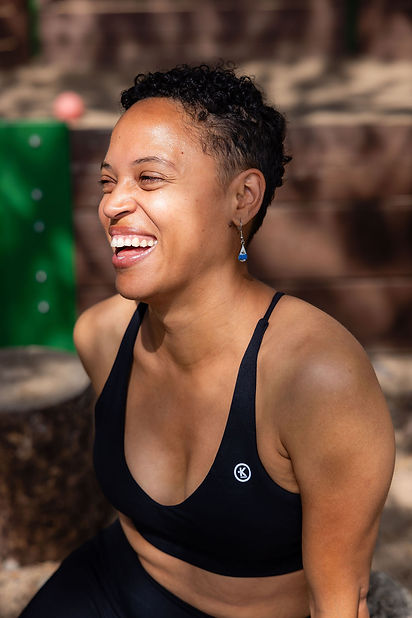About Stephanie
Stephanie Parker (she/her) is a Black, Queer somatic practitioner, licensed Nia movement instructor, and DEI & Wellness facilitator based in Oakland, California. She creates safe, affirming, sacred, decolonial spaces, guiding in a nonhierarchical way that allows collective wisdom to emerge from the group. Stephanie is initiated in Afro-Cuban spiritual practice, and weaves sacred ritual into all of her offerings.
She was called to the path of ancestral healing by her own body’s divine act of refusal in the form of severe upper body-wide nerve pain, a condition that led her to step away from both her social justice organizing work and decade-long career in the tech industry. Stephanie’s search for relief led her to her first Nia Dance class, where she experienced the physical release of trapped emotions, loving intergenerational community, and the embodied sensation of feeling both freedom and safety at the same time. It was this spirit-led encounter that served as a catalyst for her decision to walk in her purpose as a healer.
In her work, Stephanie draws upon the modalities that have been most supportive in her own healing journey: Somatic Experiencing Therapy, Nia Dance, Chronic Pain & Inflammation Research, Yoga, Parts Work, and Trauma-Informed Nonviolent Communication. She brings a liberatory, anti-oppressive lens to these modalities, and pays respect to some of her greatest teachers who did the same: Malidoma Patrice Somé, Resmaa Menakem, Assata Shakur, Angel Kyodo Williams, and Frantz Fanon.

Our souls aspire toward growth, that is, remembering all that we have forgotten due to our trip to this place, the earth. In this context, a body in pain is a soul in longing. To shut down the pain is to override the call of the soul. When this happens it is a repressive measure taken against oneself, which has somber consequences.
Is it possible then to say that pain is good, primarily because it is a call to growth? The Dagara elders would say yes. They believe that a person who has suffered is a person who has heard pain (won Tuo). The person hears the pain as a creative action, connecting that person with his or her highest self, which prescribes an alternative to spiritual death. … It teaches that one must return to a mode of living that began with life itself.
Malidoma Patrice Somé, Ritual
